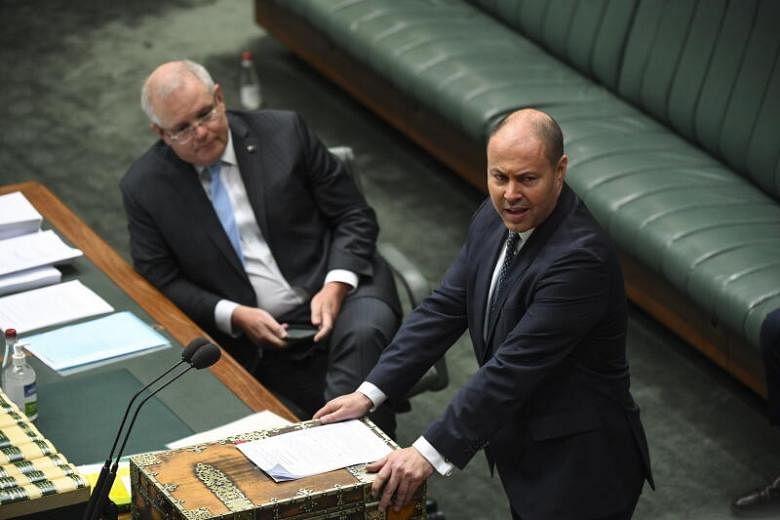SYDNEY - In a revealing moment in a hallway in Australia's Parliament this past week, the Treasurer, Mr Josh Frydenberg, was passing by the opposition leader, Mr Anthony Albanese, and offered to shake the hand of his political foe.
Mr Albanese quickly refused, pointing out that a handshake would be a breach of social distancing rules amid the coronavirus outbreak. But there was no hint of acrimony or awkwardness. Indeed, the pair promptly broke into cheery grins and fiercely agreed about the need to keep their distance. Mr Frydenberg later said of his handshake offer: "It's a habit that is hard to break."
This scene reflected an unusual development in Australia: The gravity of the coronavirus outbreak, with the country hit by more than 6,300 cases and 59 deaths to date, has brought an end to the paralysing dysfunction in Canberra of recent years and led political and ideological enemies to work together.
This has already led to effective and far-reaching economic and health measures, including the quick passage through Parliament this past week of the biggest spending measure in the nation's history - a A$130 billion (S$116.7 billion) scheme to help pay the wages of up to six million workers.
In recent weeks, Prime Minister Scott Morrison has been holding regular private discussions and briefings with Mr Albanese, the Labor Party chief, about the crisis. Both leaders have refrained from the usual hostilities and avoided political point-scoring.
Significantly, Mr Morrison has adopted big-spending emergency measures that defy the ideological inclinations of his ruling conservative Liberal-National coalition. He has doubled welfare payments, made childcare free, frozen evictions of tenants, and taken on massive debt that is expected to leave the government owing A$850 billion - a debt that could take a generation to repay.
"There are no blue teams or red teams," Mr Morrison, the Liberal Party leader, said earlier this month. "There are no more unions or bosses. There are just Australians now, that's all that matters."
Likewise, Mr Albanese said he was only interested in "solutions, not arguments".
"Everyone is putting their shoulder to the wheel," he told Sky News. "What we are seeing here is governments, political parties, people in the media, people in the private sector all coming together."
This display of unity marks a stark contrast from the partisanship and tribal loyalties that have stymied progress in Canberra in recent years and blocked reforms in crucial areas such as climate change and taxation.
Another form of bickering that has disappeared during this crisis is the tensions that typically mar relations between the federal government and the eight state and territory governments. Instead, Mr Morrison joined with the state and territory leaders to form a special national Cabinet that meets several times a week and has proven highly effective.
The Premier of the state of Victoria, Mr Daniel Andrews, who is from the opposition Labor party, heaped praise on Mr Morrison for convening the national Cabinet, saying it was a "fantastic" idea and was "working extremely well".
"We are all very grateful to be acting as one government almost, if you like, across the country rather than nine of us doing our own thing," he told The Guardian Australia.
This spirit of cooperation has also been evident in relations between unions and business groups. These two sectors - usually staunch enemies - have come together to ensure work conditions are made more flexible so that people can remain employed.
Political commentators have expressed hope that the crisis may help to finally reduce the nation's self-defeating ideological fixations and partisan divisions.
"The push and pull of different ideas being tested between governments… has been a good thing," wrote Ms Laura Tingle in The Australian Financial Review. "We are heading somewhere different as a result of this crisis. It may not necessarily be somewhere worse."
Another commentator, Mr Peter Hartcher, said Mr Morrison - unlike leaders such as United States President Donald Trump or British Prime Minister Boris Johnson - had "set politics aside".
"The noisy parlour games that so nauseated most voters for the past decade have been cancelled due to Covid-19," he wrote in The Sydney Morning Herald.
"Would the people have surrendered rights and freedoms so readily if we'd seen our political leaders locked in their customary combat and petty vanities? I very much doubt it."












